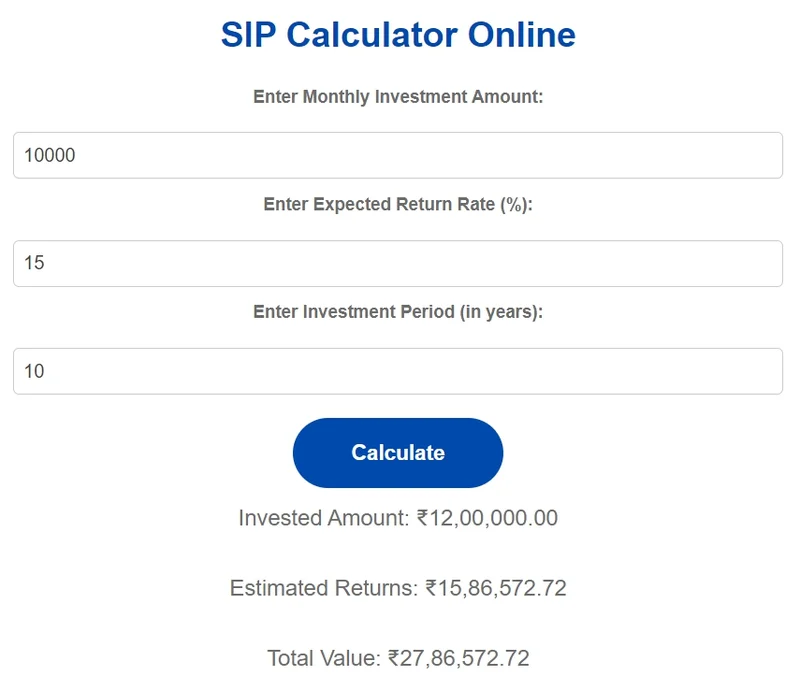Systematic investment plans (SIPs) have revolutionized the investment landscape in India. Over the past few decades SIPs have gained immense popularity as accessible and disciplined way for individuals to invest in mutual funds.
This comprehensive article delves deep into the world of SIPs in India offering an in-depth understanding of what SIPs are, their benefits, tax implications and detailed exploration of the SIP investment process.
Chapter 1: Understanding SIPs
What is SIP?
A systematic investment plan (SIP) is method of investing in mutual funds where an individual commits to investing a fixed amount at regular intervals, usually monthly. Instead of making lump sum investment, SIP allows investors to spread their investments over time.
How SIPs Work
- Investment Frequency: SIPs typically involve monthly investments, although quarterly and annual options are also available.
- Fixed Amount: Investors choose amount they want to invest each month and this amount is automatically debited from their bank account.
- NAV Based Units: The invested amount is used to purchase units of the chosen mutual fund at net asset value (NAV) of the day.
- Rupee Cost Averaging: SIPs help mitigate market volatility as investors buy more units when prices are low and fewer units when prices are high.
Chapter 2: Benefits of SIPs
Wealth Creation
SIPs offer the potential for substantial wealth creation over the long term through power of compounding.
Rupee Cost Averaging
A core advantage of SIPs is their ability to benefit from rupee cost averaging, which reduces the impact of market fluctuation.
Diversification
Mutual funds, where SIPs are primarily invested, provide diversification across various assets, reducing risk.
Professional Management
SIP investors benefit from the expertise of professional fund managers who make investment decisions on their behalf.
Flexibility
Investors can start, stop or modify their SIPs at any time, offering flexibility and control over their investments.
Tax Benefits
Certain mutual funds offer tax benefits under Section 80C of Income Tax Act, making SIPs tax efficient.
Chapter 3: Types of SIPs
Equity SIPs
Investors looking for high growth potential often opt for equity SIPs. These funds primarily invest in stocks and carry higher risk but also higher returns over long term.
Debt SIPs
Debt SIPs focus on fixed income instruments like bonds and government securities. They lower risk but offer comparatively lower returns than equity SIPs.
Hybrid SIPs
Hybrid SIPs, also known as balanced SIPs, invest in mix of equity and debt instruments, striking balance between risk and return.
Tax Saving SIPs
Tax saving SIPs, or Equity Linked Savings Schemes (ELSS), offer tax benefits under Section 80C while providing exposure to equities.
Chapter 4: SIP Investment Process
Selecting the Right Fund
Choosing the right mutual fund scheme is crucial. Consider factors like investment goals, risk tolerance and time horizon.
KYC and Account Setup
Complete Know Your Customer (KYC) formalities with the mutual fund company and set up your SIP account.
Bank Mandate Registration
Link your bank account to your SIP account to facilitate automatic debit for SIP investments.
SIP Registration
Specify the SIP amount, frequency and start date. This information is used to create SIP mandate.
Monitoring and Review
Regularly monitor your SIP investments and review your portfolio’s performance. Make adjustments as needed.
Chapter 5: Taxation of SIPs
Taxation of Gains
Understand how SIP gains taxed based on the holding period and learn about the distinction between short term and long term capital gains tax.
Tax Benefits of ELSS SIPs
Explore the tax benefits available under Section 80C for ELSS SIPs, including the maximum deduction limit.
Tax on Dividends
Learn about the dividend distribution tax (DDT) and its implications on SIP investors receiving dividends.
Chapter 6: SIP vs. Lump Sum Investment
SIP vs. Lump Sum: Pros and Cons
Compare the advantages and disadvantages of SIPs and lump sum investments to make informed choice.
Case Studies
Illustrate the difference between SIP and lump sum investments through real world case studies and scenarios.
Chapter 7: Using a SIP Calculator

Importance of SIP Calculator
Understand why using an online SIP calculator is crucial for setting financial goals and making informed investment decisions.
How to Use an SIP Calculator
Provide step by step instructions on using an online SIP calculator, including entering investment amount, expected rate of return and tenure.
Real Life Examples
Present real life examples of SIP calculations to demonstrate the growth potential of investments over time.
Conclusion
Systematic investment plans have become an integral part of the Indian investment landscape, offering disciplined approach to wealth creation. SIPs are accessible to investors with varying risk profiles and financial goals. This comprehensive guide has explored every facet of SIP, from their inception to their benefits, taxation and practical implementation.
Frequently Asked Questions (FAQs) About SIP:
What is SIP and how does it work?
SIP stands for Systematic Investment Plan. It’s method of investing in mutual funds where you commit to investing a fixed amount at regular intervals, usually monthly. This amount is automatically deducted from your bank account and used to purchase units of the chosen mutual fund.
What are the benefits of investing through SIPs?
SIPs offer several benefits, including affordability, rupee cost averaging, diversification, professional fund management, flexibility in investment amounts and potential tax benefits. They provide disciplined way to invest and harness the power of compounding.
Are SIP investments safe?
SIP investments are subject to market risks, as they primarily invest in mutual funds which can fluctuate in value. However, SIPs are considered relatively safer compared to lumpsum investments because they spread risk over time and benefit from rupee cost averaging.
Can I change or stop my SIP investments anytime?
Yes, SIPs offer flexibility. You can change the investment amount, frequency or even stop your SIP at any time without incurring penalties. Most mutual fund companies allow such modifications through their online platforms or by contacting them directly.
How do I calculate potential returns from my SIP investments?
You can calculate the potential returns from your SIP investments using an SIP calculator. Input the monthly SIP amount, expected rate of return, and investment tenure, and the calculator will provide an estimate of the future value of your investments.
Disclaimer: This article is for informational purposes only and should not be considered financial, investment or tax advice. Before making any investment decisions, it is advisable to consult with qualified financial advisor or conduct thorough research.



